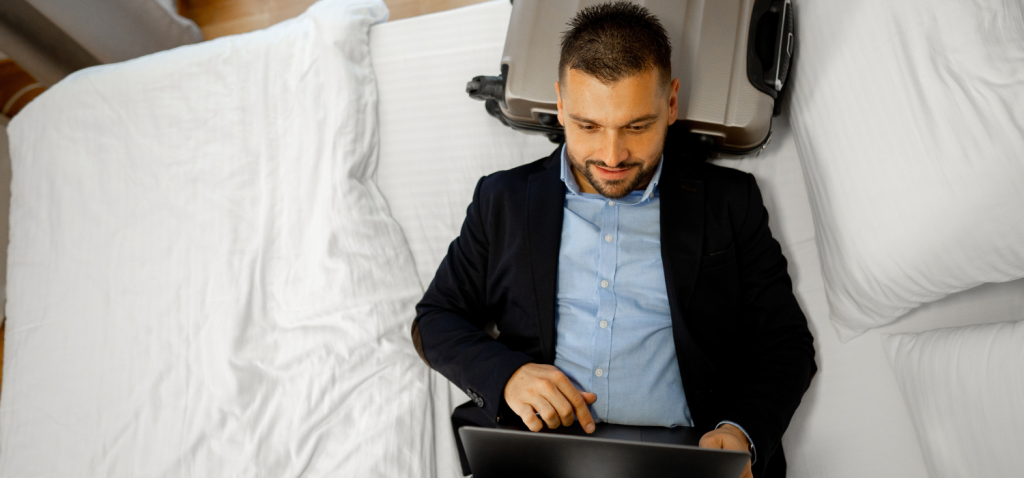for busy professionals who often travel on business, having knowledge and effective strategies in conducting a business trip can be the key to success.
In this guide, we will provide complete information and practical tips to help you plan, execute, and maximize your business travel experience. Check it out!
Definition of Business Trip
Simply put, a business trip refers to travel undertaken by individuals or groups for specific business purposes. This trip may involve various activities such as meetings with clients or business partners, attending conferences or industry events, sales presentations or team training at different locations.
Business trips generally aim to develop working relationships between companies or across countries. Through direct interaction and forming personal connections with relevant parties outside the regular work environment, new opportunities can arise and more effective collaborations can be established.
Therefore, undertaking a business trip is not just about job duties but also serves as a means of self-development and valuable interpersonal relationships.
Difference Between Business Trip & Official Travel
Although often used interchangeably, there are important differences between a business trip and official travel in terms of their context of use.
Understanding these differences will help us identify the objectives of each type of travel as well as related requirements.
Business Trip
A business trip is a type of journey undertaken by individuals or groups for specific business purposes outside their regular work environment. The main objective of a business trip is to carry out activities such as client meetings, contract negotiations, sales presentations, participation in industry events, or building relationships with business partners. In a business trip scenario , the main focus is on achieving businesses goals effectively communicating among involved parties . A typical-business-trip usually involves traveling to different locations both domestic international settings that could last anywhere from several days up weeks.
Official Travel

Official travel pertains more closely associated with official duties that must be carried out by employees within an organization according responsibilities assigned them roles.
In this case, the company sends their employees to perform specific tasks such as field visits for market research, financial audits, employee training at other branches or project inspections.
The main difference between a business trip and official travel lies in the purpose of the journey. While a business trip focuses more on business activities and building work relationships , official travel is more related to official duties that must be performed by employees according to their position or responsibilities.
Additionally, in terms of costs, usually a business trip expenses are typically borne by the traveler or organization represented by individual involved , while expenses incurred during an official travel are generally fully covered by the company.
Stereotypes About Business Trips Among Society
Business trips are often associated with glamorous images and luxurious lifestyles but there are actually various stereotypes attached to these types of journeys.
Understanding these stereotypes will help us face them realistically and gain more positive experiences when embarking on a business trip.
Here are some common stereotypes about business trips:
Work Vacation (Bleisure)
One common stereotype about business trips is that it’s like a work vacation or “bleisure”.
Some people believe that a business trip is merely an opportunity to enjoy luxury hotel facilities, relax by swimming pools, or explore tourist destinations after working hours.
However, the reality is that a business trip involves tight schedules and focuses on achieving specific goals within the framework of professional activities. Leisure time is limited and should be used wisely to achieve expected results from series of planned-business-activities.
It’s important for professionals to stay focused on their tasks during travels for effectiveness success.
Full Expense Coverage
Another stereotype assumes that all travel expenses will be fully covered by individuals who undertake s the-business-trip or organizations they represent . However applies not always applicable situationally true in every situation.
Many organizations have certain expense policies such as budget limitations or specific payment rules when conducting businesses trips. Therefore, it is important to understand company policies and requirements regarding expenses incurred during business travel.
Opportunity for Freedom from Responsibility
Some people may think that a business trip provides an opportunity to escape from the daily responsibilities at their office or regular workplace.
This stereotype leads to the perception that a business trip is a relaxed time without pressure, unlike the usual routine.

However, in reality, a business trip is often more challenging than regular work because it involves additional tasks such as facing new situations, delivering presentations in front of unfamiliar audiences, or negotiating with new business partners.
Tips for Successful Business Trips
A business trip is a valuable opportunity to expand your business network, build strong working relationships, and achieve your business goals. To ensure the success of your business travel, here are some tips that can help you:
Plan Well
Before embarking on a business trip, create detailed plans about what you want to achieve during the journey. Set specific goals such as meeting certain clients or business partners, delivering sales presentations, or attending industry events.
In addition, prepare a daily schedule including leisure time for rest and energy recovery. Make sure to organize your agenda so that all important activities are covered within the available timeframe.
Familiarize Yourself with the Destination
Knowing about the destination beforehand is crucial so that you can be well-prepared. Learn about local culture, customs, social rules as well as business norms in the country or region where you will conduct your business trip.
Having this knowledge will help you adapt to the new environment and maintain good working relationships when interacting with locals.
Prepare Important Documents
Ensure that essential documents such as passport, visa (if required), flight/hotel/conference tickets have been prepared in advance and are valid. Also check if you need additional travel insurance to protect yourself and your belongings.
Effective Communication
Communication is key to success in a business trip. Make sure you have clear contacts with local business partners, clients, or colleagues at the destination beforehand. Explain the visit agenda in detail to them and ensure that all parties involved have a shared understanding of what will be done during the trip.
Moreover, it is also important to stay connected with your team at the office or other departments so that you can provide updates on developments while being away from the office.
Choose Suitable Accommodation
Choosing accommodation is an important factor in the success of a business trip. Select hotels or accommodations that are strategic, comfortable, and within your company’s budget.
Ensure facilities such as fast internet access, comfortable workspace, and supporting services like business centers or meeting rooms are available if needed.
Stay Organized and Disciplined

Business trips often involve tight schedules and limited time to complete business tasks. Therefore, it is important to stay organized and disciplined in executing daily plans as well as respecting scheduled meetings with your business partners.
Maintain productivity during travel by avoiding unnecessary distractions such as phone calls or social media.
Evaluate and Learn from Experience
After completing a business trip, take some time to evaluate your experience. Review what worked well and what can be improved for future business travels.
Learn from every new opportunity encountered during the trip and build strong working relationships with new business partners or clients you meet along the way.
By thorough preparation, maintaining effective communication, staying organized and disciplined throughout your business journey, you can enhance opportunities for success in efficiently achieving your business goals.
Minimization
In doing a business trip, efficiency is key. Carrying too many items will not only physically burden you, but also mentally.
Imagine if you are a company executive who already feels tired and stressed at the start of the journey because you have to lift and carry heavy bags. This, of course, makes you less energetic and focused on the business meetings you will attend.
Therefore, it is important to minimize your luggage. Make sure to only bring items that are really needed and essential for your business trip.
For example, bring enough clothes, and make sure to choose clothes that can be mixed and matched so you do not need to bring too many, or by limiting the electronic equipment you bring to only what is really needed, such as a laptop, mobile phone, and charger.
Maintain a Balanced Diet & Get Enough Sleep
Health is a very important thing to pay attention to when doing a business trip. Eating healthy and balanced food will help you stay fit and productive.
When eating out, choose healthy and safe food options to avoid stomach aches or other diseases that can disrupt your productivity during your business trip. In addition, getting enough sleep is also very important to maintain your focus and productivity. Make sure to get enough sleep every night so that your body and mind stay fresh.
Stay Connected
Connectivity is very important when doing a business trip. Make sure your smartphone is ready to use at any time for safety reasons.
Make sure your smartphone is fully charged, and you have stable internet access wherever you are. Also, make sure to bring a portable charger or power bank to charge your smartphone battery when needed. Also, do not forget to activate an international roaming package or buy a local SIM card to ensure you can connect to the internet at an affordable cost.
Common Mistakes Made During Business Trips
When conducting a business trip, there are several common mistakes that are often made by business professionals. Understanding and avoiding these mistakes can help you have a smoother and more successful business journey. Here are some mistakes to avoid:
Lack of Planning
One common mistake made during a business trip is the lack of planning or failure to create a well-thought-out plan before departure. Without a clear plan, you may lose focus and fail to achieve the main objectives of the trip.
Make sure to plan your visit agenda, organize your daily schedule effectively, and prepare all necessary documents or equipment before leaving.
Unfamiliarity with the Destination Location
Another mistake is not being familiar with the destination location that will be visited. Many people tend not to take the time to learn about local culture, customs, and social norms in the country or region where they will conduct their business trip.
By not knowing these things, you may engage in actions considered impolite or cause discomfort for local business partners. It is advisable to take some time to learn about local culture and business etiquette in order to establish good working relationships.
Lack of Communication
Another common mistake is a lack of effective communication with business partners, clients, or colleagues at the destination. It is important to explain your visit agenda in detail to them before commencing your journey and ensure that all parties involved have a shared understanding of what will be done.
Misunderstanding regarding your agenda and objectives can lead to tension or misunderstandings during the business trip.
Failure To Adjust Schedules
Often people forget about adjusting their schedules according to new time zones when embarking on international business trips. Ignoring time differences can result in physical and mental fatigue as well as disrupt productivity during your work visits.
Make sure to make adjustments in your daily plans so that they align with local time zones in order to maintain a balance between work and rest.
Failure To Keep Track of Expenses
Sometimes, business professionals forget to record their expenses during the business trip, making it difficult for them to track the budget that has been used. This can have an impact on personal finances as well as company budgets.
Therefore, make sure to keep records of every expenditure including transportation costs, accommodation, meals, and others so that you can accurately report them later.
By avoiding these common mistakes, you can enhance the effectiveness of your business trips and achieve your desired objectives.
Cultural Norms to Pay Attention to When Doing a Business Trip in 2023
Dress Etiquette
In some countries, such as Middle Eastern countries, women are expected to cover their hair and bodies with loose and covered clothing. On the other hand, in Western countries, formal or semi-formal business attire is generally accepted. It is important to know and respect the dress norms in your destination country.
Body Language
Body language can vary greatly around the world. For example, in some cultures, direct eye contact is considered a sign of trust and honesty, whereas in other cultures, it can be considered impolite or intrusive. It is important to know the body language norms in your destination country to avoid misunderstandings or misinterpretations.
Eating Etiquette
In some countries, such as in Japan, slurping food loudly is considered polite because it shows that you are enjoying the food. However, in most Western countries, it is considered impolite. Also, in some countries, like in India, eating with the right hand is the norm, while the left hand is considered unclean. It is important to know and respect the eating norms in your destination country.
Gift Giving
In some cultures, giving gifts to business partners is a common practice and is considered a sign of respect. However, in some countries, such as in Sweden, it is not common and could be considered as bribery. Therefore, it is important to know the gift-giving norms in your destination country.
Business Etiquette
In some countries, such as in Germany, people tend to be very formal and serious in business meetings, whereas in countries like Brazil, the business atmosphere tends to be more relaxed. It is important to know and adapt your speaking and behaving style according to the business norms in your destination country.
Conclusion
In conducting a business trip, thorough planning and understanding of the destination location are key to success. By implementing these steps in your business travel plan, you can have a smoother and more successful experience during your business trips. Always remember that thorough preparation is the key to achieving your business objectives while traveling.


